Sustainability matters to customers and employees, but what do bosses think? To find out more about businesses’ approach to sustainability, we surveyed more than 300 managers who say their companies have sustainability measures in place. Participants represented small businesses (with under 250 employees) from a diverse range of industries. Find the detailed methodology at the bottom of this page.

Key findings:
- Saving energy and money are the main reasons companies invest in sustainability.
- Conversely, cost is the main barrier to investment. 76% of companies invest 10% or less into sustainability.
- 57% of companies have implemented sustainability measures suggested by employees.
- The COVID-19 pandemic is more likely to have increased companies’ sustainability spending than decreased it.
The environment is the top sustainability cause
Sustainability is a broad area covering many topics. Consequently, companies can choose to focus their efforts on specific initiatives.
Most firms we spoke to (74%) invest in environmental measures, with practices including reducing waste, preventing pollution, adopting clean energy, using sustainable materials, and making products sustainable.
Recycling was the most commonly reported sustainable practice, practiced by 81% of companies. 63% also try to be plastic-free or reduce the use of plastic, while the same proportion (63%) uses software to reduce the use of paper.
Social initiatives, such as health and social equity, labour rights, working conditions, and diversity and inclusion were also important to the managers we surveyed. 61% of them say their companies are investing in these areas, and 56% advocate for diversity and inclusion in areas such as recruitment.
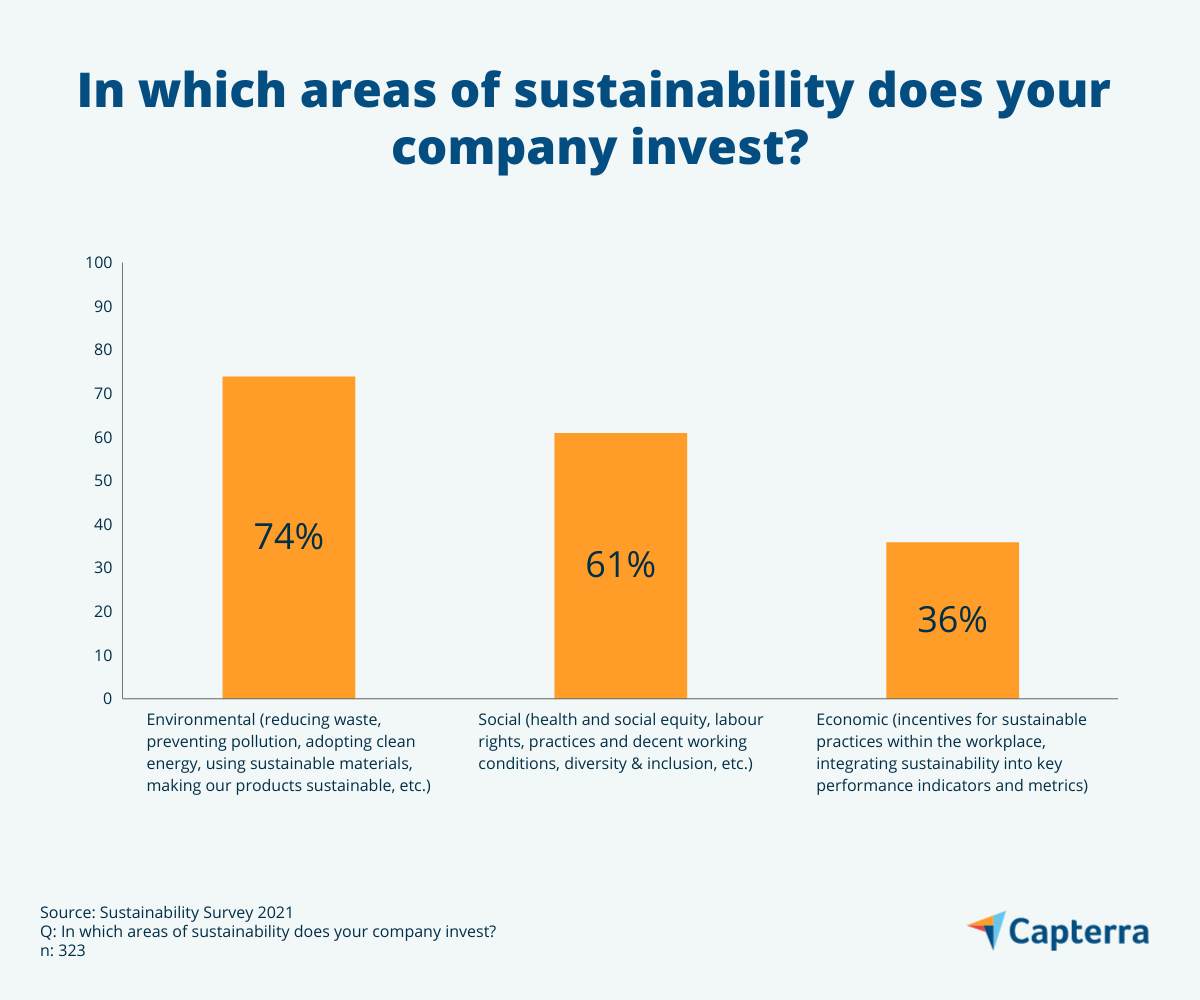
Why do companies invest in sustainability?
With sustainability gaining significant media coverage and growing in awareness among consumers, it is not surprising that companies are taking it seriously. When we spoke to managers, pragmatic concerns were the main reasons to invest. These include saving energy (46%), saving money (41%), and reputation management (35%).
However, a large proportion invest in sustainability for less obviously commercial reasons. 41% told us that they do so to be part of a positive cause, for example. And 28% want to retain and motivate employees.
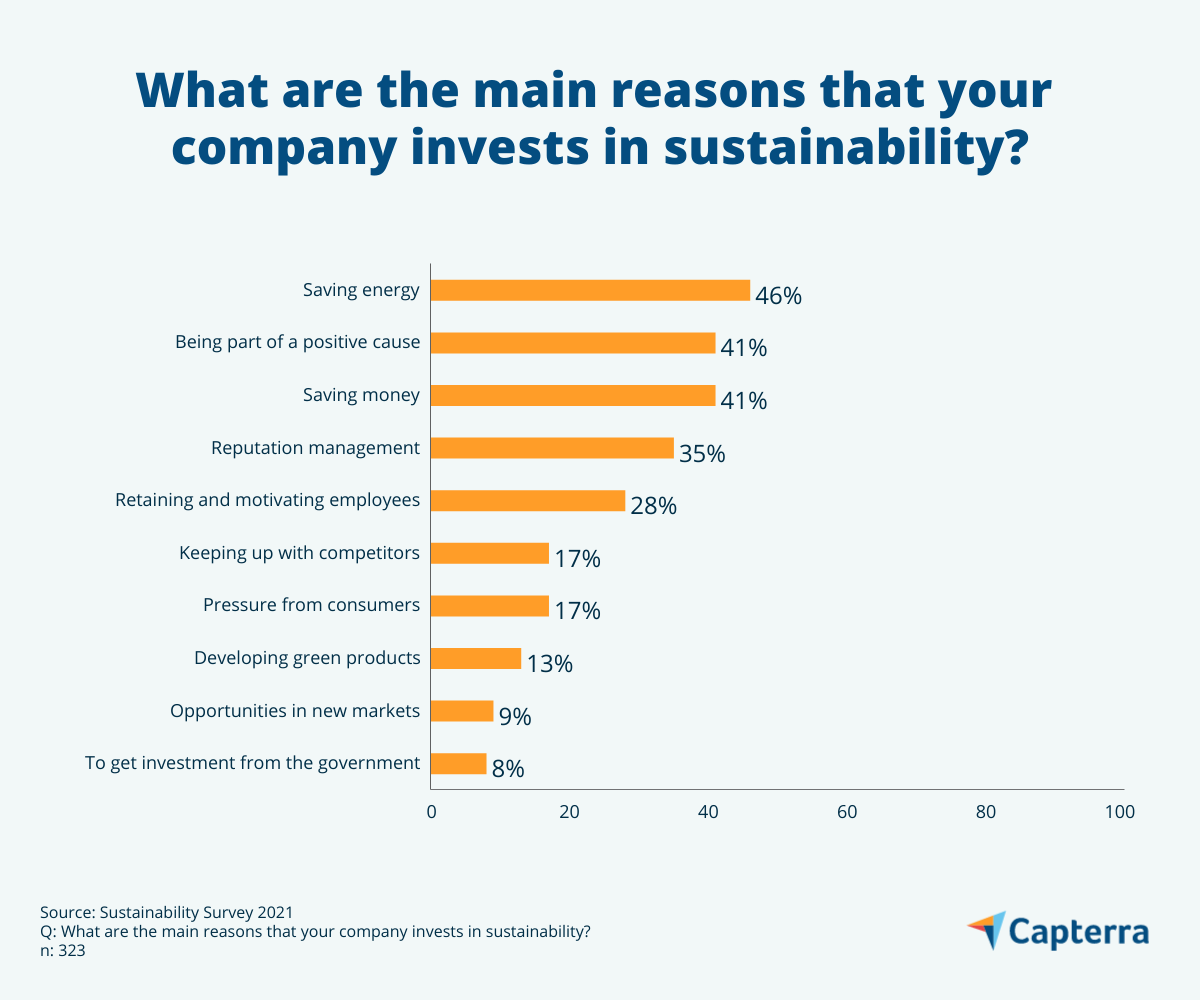
Cost is the major barrier to investment in sustainability
Business is a numbers game, and we see this applying as much to sustainability as it does to sales and sourcing.
As part of the screening process for our survey, we also identified 111 managers whose companies choose not to invest in sustainability. Again, pragmatic concerns figure prominently, with 35% saying there is a lack of financial incentive and that it is difficult to measure the return on investment. 34% say they have no capital to invest up front.
Even of those companies who do have sustainability measures in place, cost is again a major barrier to investment. Lack of financial incentive and difficulty with measuring return was mentioned by 20% of respondents, and lack of capital was mentioned by 14%. At the same time, 28% of managers say their company receives financial support from the government in its sustainability efforts.
Despite the recognition of how difficult it can be to fund sustainability, among the 323 managers whose companies do have sustainability measures in place, only 36% invest in economic measures, which include incentives for sustainable practices within the workplace and integrating sustainability into key performance indicators (KPIs) and metrics.
But how much are firms investing in sustainability? 76% of the companies we spoke to say they invest 10% or less of their business investments into sustainability incentives. 52% said they would continue to fund these even if it meant sacrificing other employee benefits such as meal vouchers or employee discounts, suggesting that it remains an area of focus.
Employee engagement is key
Of the 111 managers whose companies do not have sustainability measures in place, relatively few say that their company lacks the will to do anything. Only 6% don’t believe that sustainability is important, 5% say there is not enough engagement from employees, while 15% say there is a lack of consumer demand.
Interestingly, for companies that do have sustainability measures in place, 57% have implemented measures that were suggested by employees,
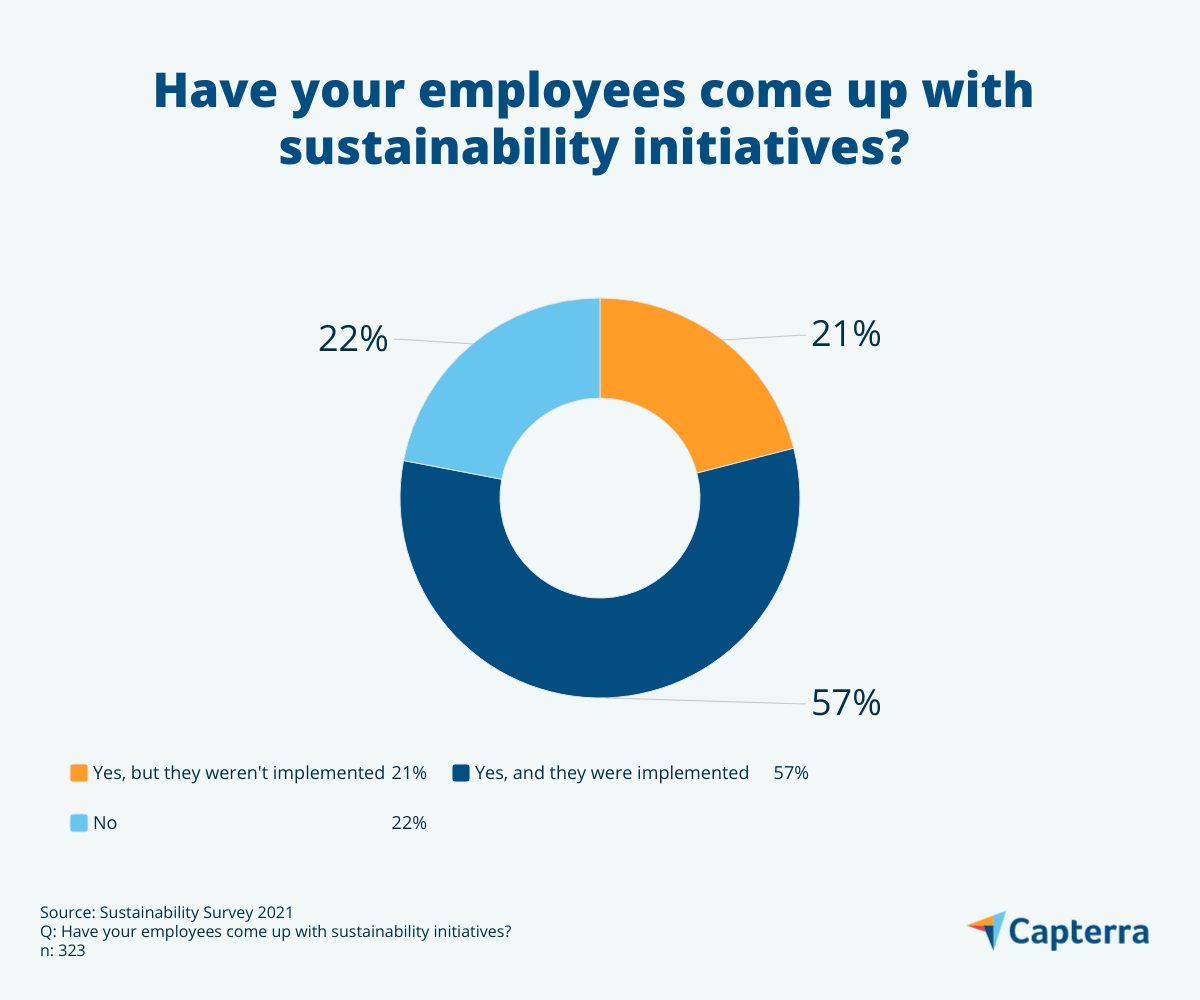
Employee engagement software is a useful way for companies to gather the kind insight they need to understand their workforce. Engagement tools can help raise awareness, conduct surveys, and motivate staff through gamification tools and rewards.
Measuring the impact of sustainability
As we have seen, many companies see sustainability as a question of investment and return and look for a business case behind it. However, quantifying this return is not easy. The difficulty of measuring the success of sustainability is given as its biggest downside, with 31% agreeing.
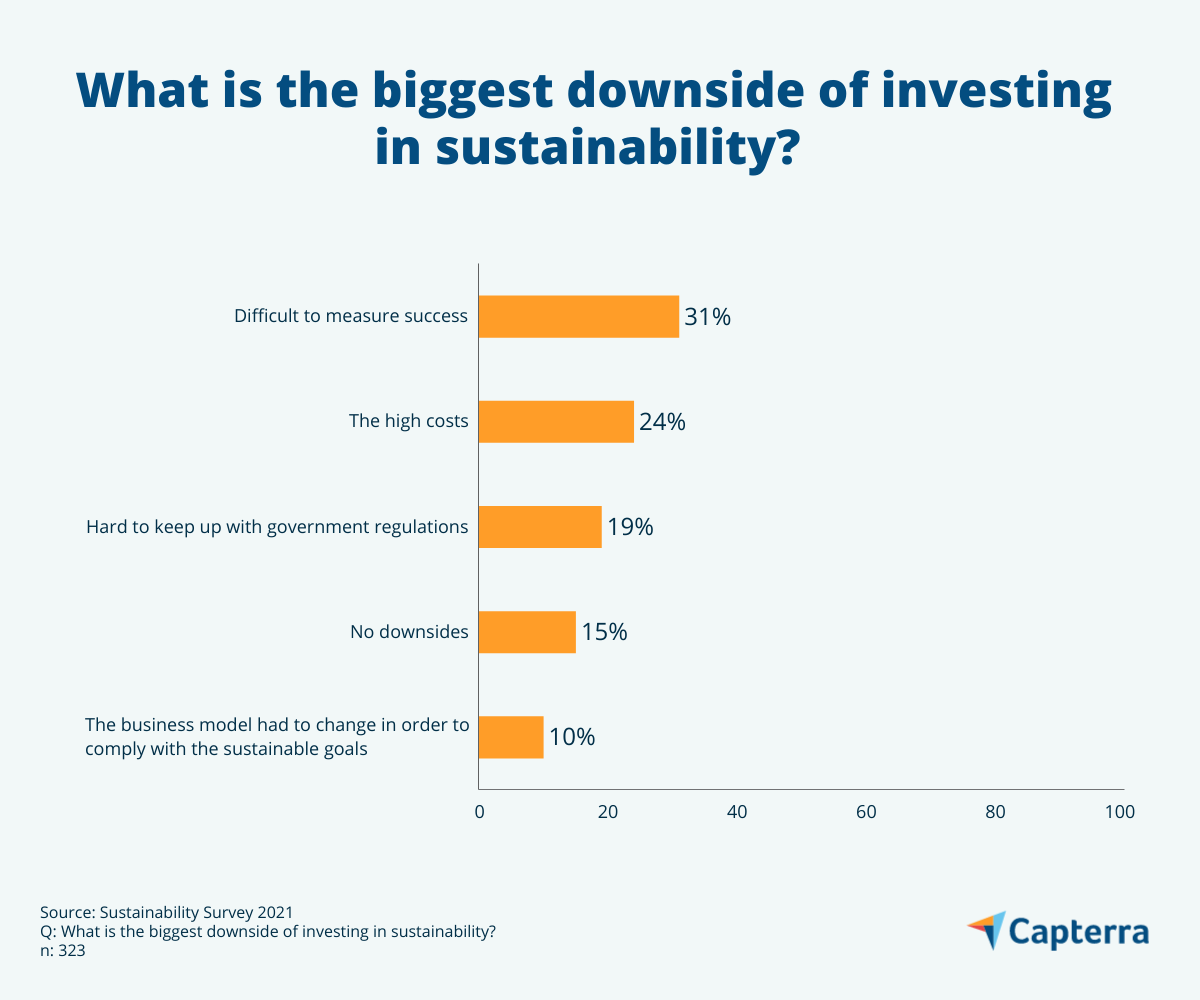
Methods of measurement vary from business to business, but the most common is by tracking customer satisfaction, which 52% of managers cited. 51% say their company tracks employee satisfaction.
When it comes to the actual benefits that companies experience, saving money comes out on top, cited by 46% of the managers we surveyed. ‘A positive change in the brand reputation’ and ‘improved internal morale’ both ranked highly, with 35%, while employee and customer retention are rated lower, with 24% and 26% respectively.
Sustainability software
45% of managers who have sustainability measures in place say their company uses sustainability software to measure how sustainable their company is or to support them with their sustainable actions. The most common tools are:
- Remote working software (33%)
- Waste management software (33%)
- Intranet software (32%)
- Supply chain management software (29%)
In most cases, managers say that the software saves them time (47%) or money (42%), but 42% also say it helps them with the organisation of sustainable actions.
The COVID-19 pandemic has been difficult for many companies. But did the disruption affect the way they approach sustainability?
How has the pandemic affected companies’ sustainability efforts?
16% of managers responding to our survey had no sustainability measures in place at all until the pandemic. And rather than stopping their investments, more than one-third of companies (36%) actually increased their sustainability actions as a result of the pandemic. 28% decreased them, while 32% didn’t report a change.
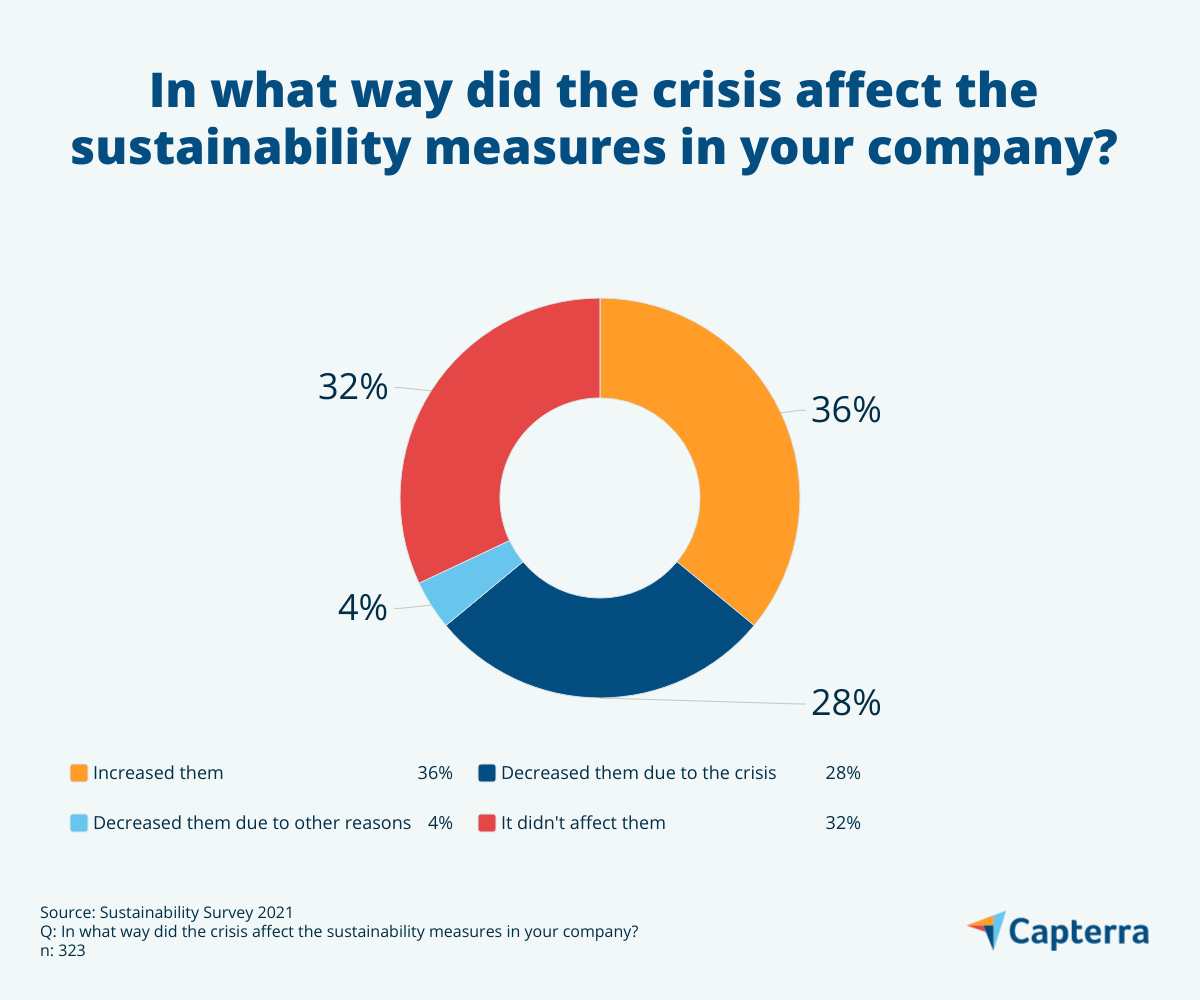
The changes look like they are here to stay. Only 3% plan to scale these increases back after the pandemic. 22% actually intend to increase investment further. This is even the case for managers outside our main survey who have nothing in place right now. 13% of these say they have plans to invest in sustainability in the next year, while one-third (33%) say they plan to invest but have not set a timeframe.
In summary
Companies invest in sustainability for practical reasons —like saving money and energy— but sometimes avoid doing so because the costs seem too high. Now is a good time to explore government assistance for sustainability projects, such as the Sustainable Innovation Fund.
Those companies that do invest say that saving money is a major benefit, but tracking the impact of sustainability investments is an ongoing challenge. Sustainability software helps with tracking, reporting on, and especially communicating sustainability initiatives— both internally and externally.
Survey methodology
To collect the data for this report, we conducted an online survey in July and August 2021. Of the total respondents, we were able to identify 434 UK respondents that fit within our criteria:
- UK resident
- Over 18 years of age
- Full-time or part-time employed
- In a management/executive position (manager or owner)
- Work in an SMB (with 2-250 employers)
In this report, we mainly focus on the results of the respondents who have sustainable measures in place (323 respondents).
